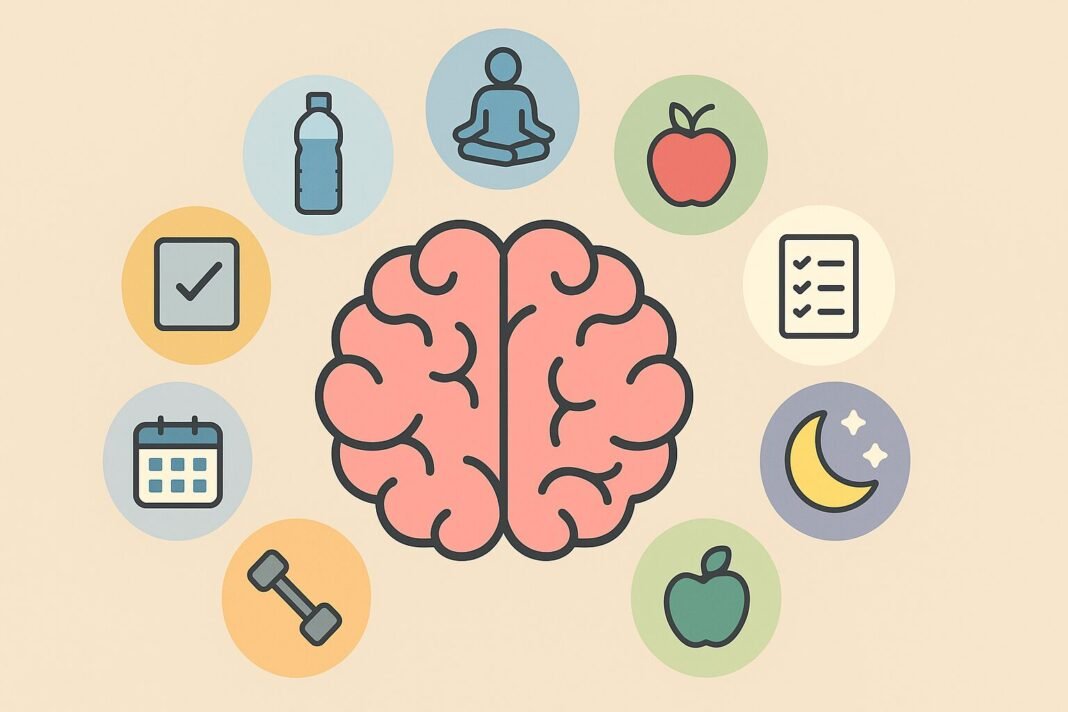
You sit down to work, but your mind feels like it’s wading through fog. You reread the same sentence five times. You’re not tired enough to nap, but not alert enough to function. Sound familiar?
This feeling has a name,mental fog,and it’s more common than you think. Whether you’re a student, remote worker, or creator juggling tabs and tasks, your brain might just be begging for clarity.
This mental clarity guide will help you understand what brain fog really means, why it happens, and how to clear it with habits that sharpen your thinking,starting today.
Table of Contents
What Is Brain Fog, Really?

Brain fog isn’t a medical diagnosis,it’s a cognitive state marked by:
- Slowed thinking
- Low mental energy
- Disorganized focus
- Lack of mental sharpness
It’s that odd zone where you’re “awake,” but not truly alert.
Think of it like having 20 tabs open in your brain,and none of them are loading.
Brain fog can come and go, last for hours or days, and is often triggered by lifestyle, emotional, or environmental factors.
Common Symptoms of Mental Fog
If you’re not sure whether you’re in a brain fog cycle, here are red flags to watch:
- Re-reading the same sentence or forgetting simple words
- Trouble staying engaged in conversation
- Getting distracted mid-task
- Mental exhaustion without physical fatigue
- Difficulty organizing your thoughts
- Feeling emotionally flat or mentally disconnected
If 3 or more sound familiar, you’re not broken,your brain is overloaded.
The Hidden Causes of Mental Fog
1. Lifestyle Factors
- Poor sleep: Your brain clears toxins and resets memory during sleep
- Blood sugar rollercoasters: Processed carbs and sugary snacks can spike/crash focus
- Lack of exercise: Movement improves oxygen flow and brain-derived neurotrophic factor (BDNF)
2. Mental Load
- Chronic stress: Triggers cortisol spikes that impair memory and focus
- Multitasking: Splits attention and increases cognitive fatigue
- Emotional residue: Unprocessed feelings become background noise
3. Tech Overload
- Screen fatigue: Excess blue light and screen time overstimulates the brain
- Dopamine depletion: Constant scrolling trains your brain to seek stimulation, not depth
- Information overflow: Too many inputs, not enough reflection
Quick Fixes to Clear Brain Fog Fast
If you need a quick clarity reset, these 1–5 minute tricks can help:
| Fix | Time Needed | Best For |
| Cold face rinse | 1 min | Snap out of morning fog |
| Brain dump | 3 min | Calm racing thoughts |
| Natural light | 5 min | Reset circadian alertness |
| Box breathing | 2 min | Reduce anxiety, boost oxygen |
| Protein snack | 3 min | Balance energy |
9 Long-Term Strategies for Lasting Mental Clarity
Quick fixes help in the moment,but these 9 strategies train your brain to stay sharp longer:
1. Start Your Day Tech-Free
Avoid news, email, and notifications for the first 60 minutes. Start with light, hydration, and intention.
2. Fuel with Brain-Boosting Nutrition
- Prioritize protein at breakfast
- Add Omega-3s, magnesium, and B-complex vitamins
- Avoid excessive caffeine and sugar
3. Optimize Your Sleep Cycle
- Sleep in a cool, dark room
- Maintain the same sleep/wake time,even weekends
- Turn off screens 60 minutes before bed
4. Limit Dopamine Spikes
- Use grayscale mode on your phone
- Cap social media at 30 minutes/day
- Swap TikTok scrolling for journaling or stretching
5. Declutter Your Digital Environment
- Try extensions like Minimal New Tab or Toby
- Keep only 3–5 tabs open
- Mute non-essential notifications
6. Use Micro-Habits for Focus Anchoring
- Morning breathwork or journaling (3–5 mins)
- Daily clarity check-in: 3 priorities + 1 reset
- “Shut-down” ritual to clear work stress
7. Move Daily
- Aim for 20–30 minutes of walking, stretching, or light cardio
- Movement supports blood flow and clears mental residue
8. Talk It Out
Don’t bottle stress,talk to a friend, mentor, or therapist. Externalizing thoughts reduces internal clutter.
9. Protect Your Peak Focus Window
- Block 1–2 hours in the morning for deep work
- Use tools like Focusmate or Brain.fm
- Avoid meetings during peak clarity hours
My Mental Clarity Shift: One Small Habit That Changed Everything

The first thing I stopped doing? Checking my phone before breakfast.
I replaced it with 10 minutes of stillness, sunlight, and journaling. That shift gave me the mental spaciousness I didn’t know I needed. Over time, it turned into a cascade of sharper thinking, calmer mornings, and deeper work blocks.
Sometimes, all it takes is one change to create clarity.
Final Thoughts: Your Mind Was Built to Be Clear
You’re not broken. You’re just digitally drained.
Clarity isn’t about working harder,it’s about reducing noise, recovering focus, and realigning your brain with what it does best: deep thinking.
Try just one of these clarity steps today. Feel what shifts. You deserve a mind that works with you, not against you.





